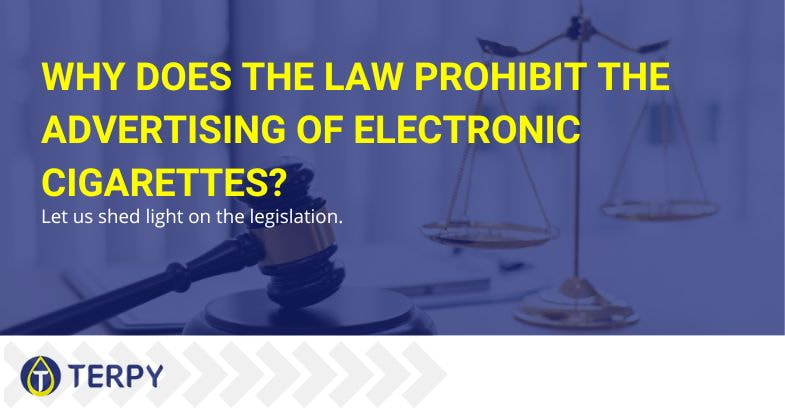Modified on: 27/05/2024
The reasons behind the ban on advertising electronic cigarettes
In the modern age, we are increasingly bombarded by advertising, not only on traditional communication channels but also on social networks. However, if you think about it for a moment, you never see commercials or ads about e-cigarettes or vaping products. If you have been paying attention, you may have wondered whether this is a choice or an imposition.
The answer, in this case, seems obvious. In the following lines, we will clarify what the law says about advertisements for classic and electronic cigarettes and find out why they cannot be advertised either.


Smoking law: what it says about advertising
The harm of smoking has been well-known for decades, and it is no coincidence that it is prohibited to promote it through any communication channel. You will undoubtedly have noticed that commercials or images that aim to advertise cigarette or tobacco brands are neither on TV, in newspapers, nor on posters. The reason is simple: in our country, there is a somewhat outdated law in force – Law No. 165 of 1962 – the text clearly and unequivocally prohibits advertising for tobacco products, regardless of whether they are domestic or foreign.
Although on some occasions this law has been circumvented (suffice it to think that up until a few decades ago, international events such as the Formula 1 Grand Prix held were a veritable fair of cigarette brand advertising), with time, the State has increasingly countered the dissemination of images potentially glorifying smoking, even limiting the space reserved for the manufacturer’s logo in the packets, in favour of dissuasive messages.
Despite the advertising ban, the number of smokers is still too high, and among the tools helping people get rid of this health-damaging habit, electronic cigarette is gaining more and more space. Despite this, vaping devices, liquids, liquid nicotine, and e-cigarette flavourings cannot be advertised. Let’s find out why.
Read also: Carbon monoxide and electronic cigarettes: What does the scientific research say?
Why banned advertising includes e-cigarettes
The fact that a device that was created to combat smoking is subject to an advertising ban may seem like a contradiction in terms. But it is tough to find why a practice such as vaping, which helps smokers to give up a vice that causes millions of deaths worldwide every year, should be subject to the same restrictions on advertising as tobacco.
The electronic cigarette allows you to say goodbye to blondes without experiencing nicotine withdrawal. Many ex-smokers have come out of the smoking tunnel precisely because vaping exposes you to 95% fewer health risks. Still, you can dose the amount of nicotine and gradually decrease it until it is eliminated.
Those who legislate, however, have not only thought about the positive aspects of vaping but also about the risks for non-smokers. In essence, the electronic cigarette is also considered a potential forerunner for smoking, especially for young people; therefore, although vaping does not involve taking the many toxic substances of the analogue cigarette, it is in some way associated with smoking, and for this reason, it is not permitted to promote it or to advertise tobacco-related products such as tobacco, creamy, fruity and unique liquids.


Which law extends the ban on the promotion also to e-cigarettes
We mentioned earlier that the law regulating smoking is rather old (just this year, it turned 60 years old). Since 1962, there was not even a shadow of the idea of a device such as an electronic cigarette. Therefore, it is plausible that you are wondering whether this law has been amended by adding new paragraphs on vaping or whether the state has reserved an ad hoc law for this practice.
You should know that electronic cigarettes are considered tobacco-related products by EU Directive 2014/40/EU. Based on the principles set out in this text, Italy enacted Legislative Decree 6/2016 prohibiting advertising for both vaping devices and e-cigarette liquid containers. This ban was recently clarified by the Ministry of Health, which in 2020 accepted a complaint by Codacons denouncing the presence of advertisements for e-cig devices and tobacco warmers in some public places and on social media, reiterating that the promotion of such products violates current regulations.
Of course, the ban concerns the products but not the companies that sell them: a shop that sells vaping devices or a company that produces and sells ready-made liquids, e-liquid bases, vape flavourings and similar products can promote their business.
Read also: Synthetic nicotine banned in the USA: what are the possible consequences?
In conclusion
We do not know whether the law prohibiting the advertising of vaping products will ever be changed. However, one factor that could push the state to reconsider this legislation could be an increasing number of ex-smokers who manage to quit smoking thanks to this practice.
If you are among them, you can find quality vape liquids and everything you need to customise them to your liking in terms of flavour and nicotine percentage at Terpy.
We are waiting for you on Terpy.





